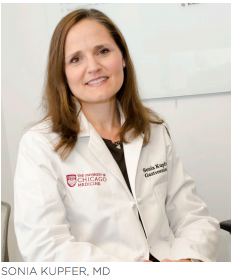Association Between Gastrointestinal Cancer and Celiac Disease

A number of studies have considered associations between gastrointestinal cancer and celiac disease. Taken together, these studies have shown uniformly that risk of small intestinal cancer is increased in celiac disease.
- Risk of Gastrointestinal Cancer in Celiac Disease by Sonia Kupfer excerpted from Impact, Celiac Disease Newsletter, 2016, Issue 03
- Subscribe to Impact Newsletter
 Cancers of the gastrointestinal tract are among the most common and deadliest tumors affecting Americans. Colorectal cancer is the second most common cancer among men and women. Esophageal and stomach cancers have poor 5-year survival rates ranging between 20-30%.
Cancers of the gastrointestinal tract are among the most common and deadliest tumors affecting Americans. Colorectal cancer is the second most common cancer among men and women. Esophageal and stomach cancers have poor 5-year survival rates ranging between 20-30%.
Environmental factors are thought to play an important role in development of gastrointestinal cancers. For example, the World Health Organization recently placed processed and red meats into the highest category of carcinogens based on studies linking them to colorectal cancer.
In addition, medical conditions such as long-standing inflammatory bowel disease of the colon are associated with increased risk of some cancers including colorectal cancer. However, the associations of celiac disease with gastrointestinal cancers are less clear.
Gastrointestinal Cancer and Celiac Disease
A number of studies have considered associations between gastrointestinal cancer and celiac disease. In aggregate, these studies have shown uniformly that risk of small intestinal cancer is increased in celiac disease. The largest studies to find increased risk of small intestinal cancer come from Scandinavia.
 A Swedish study by Askling and colleagues studied 12,000 hospitalized subjects with celiac disease between 1964 and1994 and assessed cancer incidence. The authors found the incidence of small intestinal cancer was 10-fold higher than in the general population.
A Swedish study by Askling and colleagues studied 12,000 hospitalized subjects with celiac disease between 1964 and1994 and assessed cancer incidence. The authors found the incidence of small intestinal cancer was 10-fold higher than in the general population.
- A second Swedish study by Ludvigsson and colleagues also found an increased incidence of small intestinal cancer in celiac disease with a 2-fold increased risk. This risk was noted after the first year after celiac disease diagnosis.
- Finally, Ilus and colleagues studied 32,439 Finnish adult celiac patients and found that small intestinal cancer was increased 4-fold over the general population. These authors used a nationwide register of celiac patients and linked it to the nationwide cancer registry. Based on these last two more contemporary studies, the true risk of small intestinal cancer in celiac disease is 2 to 4-fold increased.
Other Gastrointestinal Cancers
Risks of other gastrointestinal cancers in celiac disease show less uniform results in these studies.
- The risk of colon cancer was modestly increased in 2 of the 3 studies, though this increased risk was not noted for rectal cancer. In the Ludvigsson study, risk of colorectal cancer was increased only in the first year after diagnosis but did not persist after that.
- Esophageal cancer was increased 4-fold in the older Askling study but not significantly increased in the 2 more recent studies.
- Finally, stomach cancer was not increased among celiac disease patients in these studies.
What can we conclude about gastrointestinal malignancy in celiac disease?
First, small intestinal cancer risk is increased in celiac patients and persists beyond the first year after diagnosis.
- Long-standing inflammation due to celiac disease is likely the primary risk factor for malignant transformation.
- It is important to note that small intestinal cancer is a rare cancer in the general population, so the absolute risk remains very small, even in celiac disease.
- There is no screening test for small intestinal cancer, so patients and physicians should be aware of new symptoms, laboratory abnormalities or clinical changes that could warrant further evaluation.
Second, colorectal cancer risk is likely not increased in celiac disease based on results from the Ludvigsson study in which risk after one year after diagnosis was not different from the general population.
- Symptoms of colorectal cancer and celiac disease are similar and, therefore, diagnoses of both conditions could occur at the same time but not be causatively linked.
- Patients with celiac disease should follow routine screening recommendations based on age as well as personal and family history of pre-cancerous polyps for colorectal cancer.
- Finally, esophageal and stomach cancer risks are also not convincingly associated with celiac disease. However, symptoms suggestive of these conditions should be discussed with a physician and warrant further investigation.
 The University of Chicago Celiac Disease Center is entirely funded by private donations. Help Fund the Cure!
The University of Chicago Celiac Disease Center is entirely funded by private donations. Help Fund the Cure!
“The University of Chicago Celiac Disease Center is dedicated to finding a cure for celiac disease. As we focus on research toward a cure, we also strive to raise awareness and diagnosis rates through education and advocacy.”
“Our work is entirely funded by private donations. Until we are able to raise enough funds for an endowment, growing and sustaining our research and much-needed programs and services require us to raise new funds each year.”
Donating is quick and easy DONATE NOW

 A Swedish study by Askling and colleagues studied 12,000 hospitalized subjects with celiac disease between 1964 and1994 and assessed cancer incidence. The authors found the incidence of small intestinal cancer was 10-fold higher than in the general population.
A Swedish study by Askling and colleagues studied 12,000 hospitalized subjects with celiac disease between 1964 and1994 and assessed cancer incidence. The authors found the incidence of small intestinal cancer was 10-fold higher than in the general population.















